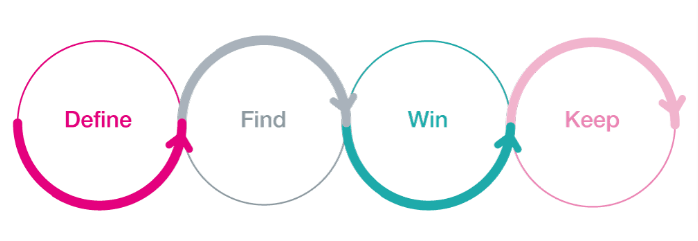Ready to explore the possibilities?
Request a quick call with our team to find out how the Innovation Explorer program can help your business take its next big leap into AI and automation.

Let’s Talk… Serious Strategy with Ged Leigh of The Marketing Centre
“Digital is considered as this amorphous “thing” when actually it is a multitude of individual but connected items that need to be part of the strategy and delivery.”
Today we’re talking all things strategy and growth with Ged Leigh!
 Ged is a Regional Director and Marketing Director/CMO at The Marketing Centre. He has been with the company since 2016 and has been instrumental in building a solid business presence in the north of the UK. With a solid background in product management, marketing, and innovation management, Ged has helped young marketing executives and managers to become better marketers and mentored them to point them in the right direction. He finds the most satisfying achievements to be those where he helps people, and he takes pride in the success of the team effort that has established The Marketing Centre as the largest revenue-generating region in the company.
Ged is a Regional Director and Marketing Director/CMO at The Marketing Centre. He has been with the company since 2016 and has been instrumental in building a solid business presence in the north of the UK. With a solid background in product management, marketing, and innovation management, Ged has helped young marketing executives and managers to become better marketers and mentored them to point them in the right direction. He finds the most satisfying achievements to be those where he helps people, and he takes pride in the success of the team effort that has established The Marketing Centre as the largest revenue-generating region in the company.
Leon:
Hi Ged. Thanks for joining us!
Kicking off with the first question… What are the primary marketing challenges facing the businesses that you work with? What is the trigger for you getting involved?
Ged:
We work with all types of businesses, we’re pretty much sector agnostic, they are generally ambitious to grow and have some thoughts and ideas about how or where their opportunities might be, but they are unsure of the how. There tends to be two similarities to the businesses when we meet them, either they have no marketing function at all, or they have one, but it’s just not turning the dials in the right direction. The business is spending money but without seeing a return on that investment.
In both cases, the business tends to see marketing through a tactical lens. It’s all about lead generation, advertising, comms or trade shows…etc, but without a strategy behind it, and almost certainly without having any real measures of success. In most cases the businesses haven’t really defined the key strategic elements of a sound marketing function, because they don’t know how to, they don’t have that capability in the business in many instances, hence they always default to a tactical answer or solution, even if the question is a strategic one.
Sometimes it can be quite fundamental; things like not really understanding where their opportunities might be, or where the roadblocks to growth might be, perhaps not really understanding who their ideal customer profile is or should be. I have recently worked with a business that had already decided to diversify into new international markets when we started to work with their senior team before they had even understood if they could achieve their ambitions in their existing markets. Once we presented their opportunities in a way they hadn’t thought about, they cancelled the international expansion and saved themselves a huge amount of wasted energy and resource.
We see that ineffective marketing activity usually results from a lack of a coherent strategy. Do you think many businesses REALLY have a grip on foundational marketing principles? Their product-market fit, their ideal customer and how marketing interfaces with their sales process?
I mentioned above the lack of strategic marketing capability or expertise in many SME businesses, which isn’t a criticism, just an observation having worked in dozens of businesses personally and hundreds as a business. I recently had a conversation with a Sales Director in the first couple of days of working in a new business. He was hugely dismissive of marketing, and said “it won’t work in this business”. When I probed a little deeper, what he really meant was advertising wouldn’t work in this business. His understanding of what marketing really is, was very low, almost at a superficial level. This level of understanding is not uncommon and part of our role when we start working in a business is to educate the business on what marketing is. What are the strategic and tactical elements that make up part of a best-fit strategy in their businesses? We have an in-house developed online tool, we call it the Marketing 360, it allows a business to measure their marketing maturity and considers the strategic and tactical elements. It’s a great tool and is available here
The framework really helps businesses to see marketing on a page and where each of the pieces fit together.
Sales and marketing need to work together to deliver an effective commercial strategy and quite often a sales function that doesn’t really understand what marketing is and actually how it can help them, they can be dismissive of a marketing function. It’s not uncommon for disharmony to exist between sales and marketing teams. Part of our role in a business is to get them on the same page and understanding that the effective delivery of the strategy needs all of them, working together. The 360 is a really good tool to help with the educational piece in a business.

As we speak today, the country is facing a cost of living crisis, a recession, and spiralling energy prices… whilst we like to look at the world through a positive lens, how do these issues affect the businesses you’re working with?
Really interesting question and whilst we all see the doom and gloom on the TV each evening, if I think about the businesses we are working with and our own business at The Marketing Centre, we are not yet seeing the impact. For sure consumer confidence and business output are falling, but businesses are generally optimistic, partly due to easing cost pressures and falling energy prices. We have seen supply chain disruptions and price volatility but that appears to be settling somewhat.
If I think about business growth, which is usually why we are asked to help, most businesses we work with are reporting healthy pipelines and good financial performances. The few businesses that are struggling have tended to be businesses that have a B2C, direct-to-consumer offering, and often their proposition has been in the luxury end where consumers are perhaps looking to move into a more budget-conscious space.
I think the greatest challenge to the SME business community, and perhaps the wider one is access to talent. Recruitment is becoming a major issue for many businesses that are wrestling with (perhaps) outdated working practices, increasing labour costs, and limited resources in HR to mention but a few challenges. I can only really see and talk about marketing recruitment and the impact on the businesses we work with, but I have never had so many businesses asking us to help with recruitment. I think it is a major issue for many businesses right now, and one that could remain well into next year and perhaps beyond.
It makes sense that investing in strategic marketing sows the seeds for future growth. From a ‘channel-agnostic’ view of a strategic marketer – how would you suggest that, let’s say, ambitious SMEs budget for marketing across all channels?
Budget is always a question I get asked when I meet a prospective client. Particularly the ones that might never have had a marketing budget before but also the ones that have had one, but have failed to see a return on it. Mostly they want me to give them a magic number of x% of sale revenue or some other blind metric. If only it was so simple. The answer I give is always the same. You need a robust strategy that informs the operational tactical activity plan and clarity on the key measures of success. Once you have these you can then start to look at, and allocate a budget. Without the strategic and operational elements and the measures of success you cannot define with any certainty what a budget and spend should look like and hence what the ROI should or could be.
No businesses have an infinite budget to invest in marketing so it’s crucial that your budgeting process is informed by those three key elements. If not, then you will probably be wasting money, but in all likelihood, you will have little understanding of where.
Yes indeed, at Door4 we’re also often asked “what should the budget be?” – and, as with your own thorough assessment, that must be a product of the desired result and the required work to achieve it.
Leaning into the notion of ROI and strategy – how do you combine these with KPIs and goal-setting to counteract these ‘random acts of marketing’ that we’re all so fond of!
Oh, how long have you got? In simple terms, the strategy informs the activities and the KPIs…and then the KPIs inform the goal-setting at the different levels in the business, which could be business, department and individual in a simple matrix-type organisation. Once you have a strategy, activity plan and KPI’s aligned you can then start to define the ROI targets. These will obviously change as you gather insight and data, which should then allow you to refine the activities to better align with the optimum ROI. That isn’t easy and can take months and numerous campaigns to test, measure and iterate.
Once you have the “machine” working you can start to work on continuous improvement cycles to drive improvements in ROI. Crucial to this though is data that drives insightful decisions. Without insights, you will always tend to fall back on what’s worked before which could well be described as random acts of marketing. Having a decent CRM and a single point of truth is what allows you to gain insights. If I was making one recommendation to any business on how to align ROI, strategy, and KPIs, it would be to get a decent CRM that allows you to have these insightful moments that will allow you to make better decisions.
You mentioned recruitment, above. We frequently engage with local education providers and marketing/digital clusters… people, skills (and the perceived lack of) remain a hot topic.
We all understand that the talent pool needs to keep up to date with broader ‘digital capability’ – but on a more macro level, what skills do you see in the marketing field? Do you think that there are enough capable people, who have the right focus?
The basic skills of marketing have not really changed, what has though is the advancements in technology that now generates vast amounts of data, and the behaviour of consumers that now have access to the answer to any question they may have. I see too much focus on social media, and whilst this might be a channel that is part of the delivery they are nothing more than online platforms that allow us to share and network.
If I was a young marketer coming into the industry I would build my skills to develop and oversee the strategic direction but I would also then build on that with digital skills around data and performance that would allow me to gain more insights into consumer behaviours and preferences. Do we have enough people, who have the right focus? I would question if we have; data, analytics, and research are all “hard” topics, social media is just more attractive. The career winners though will be the ones driven by gaining a better understanding of what motivates consumers.

And so, I guess, as we think about our respective businesses… we obviously have a very specific digital focus, and we aim our sights at specific businesses. From your standpoint in the boardroom – how do you think industry, particularly the “non e-commerce” part, view the world of digital marketing? Friend or foe?
I think much of the SME boardrooms are sceptical of “digital”, mainly because they don’t understand it, and in many cases don’t want to. There are still a few luddites in the business world!
Part of our role as fractional or part-time CMOs/Marketing Directors is to educate the business (including the boardroom) of what marketing is and is not in their businesses. Most boardrooms see marketing as advertising and comms, and whilst that might well be part of their marketing strategy it is much more than that. Digital is considered as this amorphous “thing” when actually it is a multitude of individual but connected items that need to be part of the strategy and delivery.
If I had to pick a friend or foe it probably sits more with the foe in most businesses, but it is changing… albeit slowly. It’s our job to educate people and not just marketers, we need to educate the business leaders and help them to understand that digital is merely a component (or two) of the strategic delivery, and the business needs to embrace it.
_____________________
A huge thank you to Ged for taking the time to chat with us!
-
 15.02.2023|We speak with John Logue, a marketing expert specialising in both the alcoholic and non alcoholic beverage industry.
15.02.2023|We speak with John Logue, a marketing expert specialising in both the alcoholic and non alcoholic beverage industry. -
 21.12.2022|We asked Door4 Head of Acquisition, Tom Morton, should I be using Google Performance Max?
21.12.2022|We asked Door4 Head of Acquisition, Tom Morton, should I be using Google Performance Max? -
 08.12.2022|Leon Calverley talks about the past, present and future of communications with Tony Garner.
08.12.2022|Leon Calverley talks about the past, present and future of communications with Tony Garner.
Door4 opinions and insight.
We have a lot to talk about.Our latest articles, features and ramblings.
We explore performance marketing, AI, communications and optimisation.











